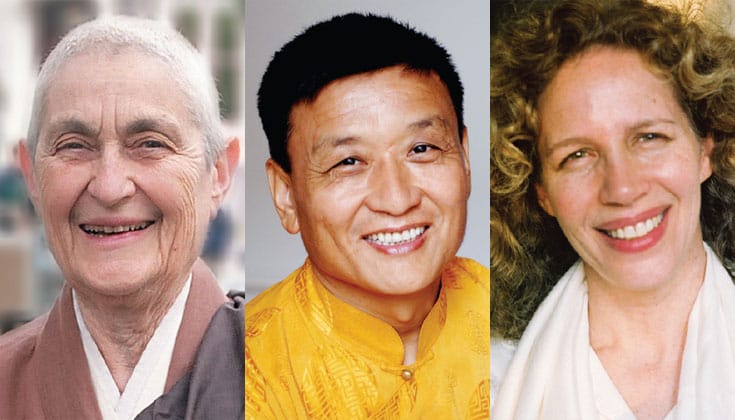Question: A friend of mine is considering getting an abortion. She asked me for advice, but as a Buddhist, I don’t really know what to say. I’m concerned that it violates the first precept and will have negative karmic consequences, but in my heart, it feels more complicated than that. How would you counsel someone in my friend’s situation?
Narayan Helen Liebenson: I recommend that you listen to your friend as deeply as you can and with as much openheartedness as possible. Even though she’s seeking your advice, I don’t think it’s wise to offer any views or opinions. It isn’t the right time for that. The best thing you can do is provide a space of kindness and wisdom so she can listen to herself.
Right now whatever you say will just be another opinion that she will take or leave, according to her own heart and circumstances. However, it will influence her in ways that won’t necessarily be healthy. Over the years I have been in your situation many times, and I have never offered advice. Perhaps at times I have leaned a bit, but afterward I hoped my slight leaning wasn’t picked up on.
I have a teacher friend who told me once that in her early years of teaching, she would instruct yoginis who were pregnant not have abortions under any circumstances. She regrets doing so now. This is a decision that must be made by the person involved. Friends can help immensely by staying open and clear. This compassionate clarity provides a context within which one can inquire deeply into this question without fear of condemnation and shame.
In general, I hold the perspective of being anti-abortion and pro-choice. I don’t think anyone in his or her heart of hearts is really “for” abortion. It is never desirable. At the same time, compassion means holding the greater picture and not leaving anyone or anything out. This requires the capacity to hold the complexity of things and the ability to recognize the mysterious nature of this world that is far from simple and basically unknowable.
Do your best to bring the biggest mind and the greatest perspective possible to your friend and be willing to be open to the suffering of all involved without taking sides. In this way, you can be truly helpful.
Tenzin Wangyal Rinpoche: There is no one clear or simple answer to this question. Any guidance I might offer would depend on the situation of the woman who conceived the child. If a woman is able to have a child without risk to her life and is willing and able to give the child love, care, attention, nourishment, and education, then to intentionally terminate a pregnancy would, according to the Buddhist teachings, constitute taking a life. It is possible that the hesitation or uncertainty on the part of the mother-to-be is a result of a lack of emotional support or confidence to bring a child into the world. Deeply listening to all of your friend’s concerns and being warmly present without judgment could be the beginning of the support she needs to embrace her condition.
However, if the mother-to-be is unwilling or unable to care for a child, then there is no virtue in giving birth, especially through a sense of religious obligation or fear. That is impure motivation and would prolong the suffering of both the mother and the child. Bringing someone into the world under unfavorable circumstances without the necessary supports for the child to grow and be nourished only increases suffering. This is equivalent to dying not just one time but many times in one lifetime, for both the mother and the child. Even though it is against Buddhist precepts to take a life, it is also not virtuous to give birth under circumstances that would increase suffering for oneself or another—a suffering that seems greater than ending a pregnancy that is unwanted.
Zenkei Blanche Hartman: The Dalai Lama has said, “Of course, abortion, from a Buddhist viewpoint, is an act of killing and is negative, generally speaking. But it depends on the circumstances… I think abortion should be approved or disapproved according to each circumstance” (New York Times, 28/11/1993).
In order to counsel someone, we need to know about the particular circumstances. I would not categorically say, “Every abortion is wrong.” There is a guideline (the first precept, “not to kill”) and there are circumstances. Have you listened carefully to your friend to understand her reasons for considering an abortion? What alternatives has she considered? Is it possible for her to carry the child to term and offer it to a couple who is searching for an infant to adopt because they cannot conceive? Or is the mother’s life or health threatened by continuing to carry the infant to term? What is the most compassionate response in this situation? That is, what would cause the least suffering for all concerned?
You may wish to read the section on the first precept in Reb Anderson’s book, Being Upright: Zen Meditation and the Bodhisattva Precepts. There is a thoughtful discussion about abortion there that may help your friend discern whether she can find a way to respond that may cause less suffering.
Whatever course of action your friend chooses, be aware that if death is involved, there will be grief. She’ll need to take care of herself and her grief, perhaps by working with her teacher, a therapist, or a grief counselor. She may also find it helpful to take part in a ceremony calling on support from Jizo Bodhisattva. And, of course, as she is your friend, I hope you will offer her your support as well.

